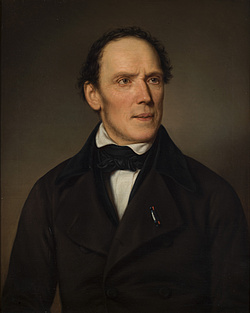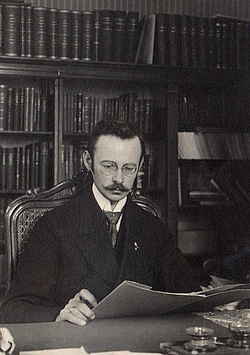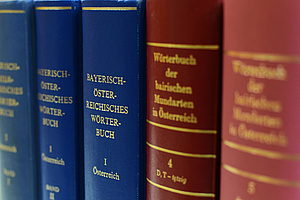History of the Bayerisches Wörterbuch
Dialect research at the Bavarian Academy of Sciences and Humanities (Bayerische Akademie der Wissenschaften BAdW) has a long tradition; the Academy in the C.19th played host to the very first Dialect Dictionary, by Johann Andreas Schmeller. In 1911, the Commission for Dialect Research (Kommission für Mundartforschung) was founded to prepare dictionaries of the various dialects in the then Kingdom of Bavaria.
Johann Andreas Schmellers Bavarian Dictionary

In the „Bayerisches Wörterbuch“ (see PDF vol. I, vol. II) edited by Johann Andreas Schmeller (*1785 Tirschenreuth, † 1852 München), the dictionary project of the BAdW has a famous forerunner.
Schmeller authored the first large-scale scientific dialect dictionary, but by the beginning of the 20th century his publication was out of print (see Schmellers Bayerisches Wörterbuch).
Today it is back in print, but it no longer meet the requirements of modern vernacular research.
The Bavarian and Austrian Dictionary Project

In cooperation with the Austrian Academy of Sciences (Österreichischen Akademie der Wissenschaften) a plan evolved to document the entire vocabulary of all Bavarian dialects of Austria and Bavaria. The Austrian Academy of Sciences was especially interested in a new dictionary project, as Schmeller in his dictionary had taken into account Austria’s dialects only marginally.
Work began in 1912, simultaneously at the Academies in Vienna and Munich. Originally the Munich office was to concentrate on collecting and sorting the dialect material for Bavaria, while publication was to take place in a single Austro-Bavarian dictionary in Vienna.
The split between Vienna and Munich

During the Second World War, work on the dictionary stopped, but it started again in 1947. Fortunately, the collection was almost completely preserved. Since Munich and Vienna belonged to different zones of occupation, contacts were difficult. Organisational, political and personal problems eventually resulted in abandonment of the original idea of a single shared dictionary for Bavaria and Austria. In the early 1960s it was decided to publish the dictionaries of dialects in Austria and in Bavaria separately. During the first decades, and especially during the war, the Munich office had only one or two employees; during the 1960s this number was increased to the current four full-time editors.
The two Academies in Munich and Vienna agreed on a procedure whereby the “Bayerisches Wörterbuch” documents all Bavarian vernaculars spoken in today’s Free State of Bavaria. The Bavarian vernaculars spoken outside of Bavaria, in Austria and neighbouring areas, are documented in the „Wörterbuch der bairischen Mundarten in Österreich“, published by the Viennese Academy.
This separation has proved to be a positive decision, since the large differences among Bavarian dialects can be handled much better in two smaller, separate works. Today the two offices at the Academies in Vienna and Munich maintain a lively collegial and friendly exchange.
